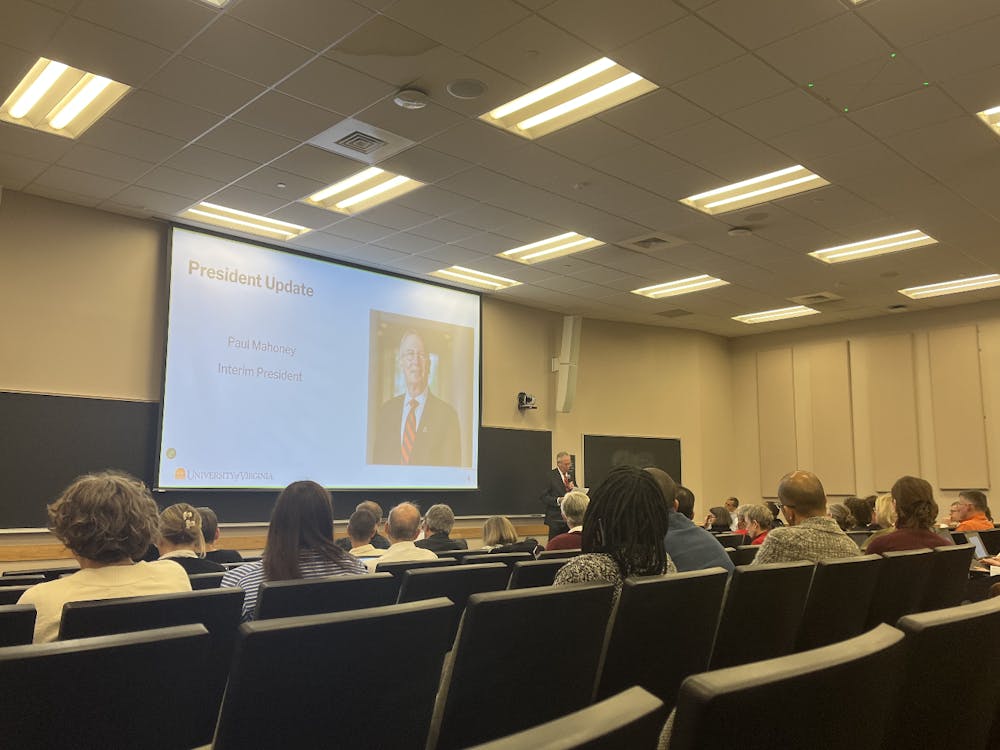Student Council unanimously approved a resolution at its meeting Tuesday in opposition to a planned curriculum change in the Music Department that would no longer grade music ensemble courses, which have the course pneumonic MUBD, under the classic A through F letter-grade system in favor of a credit/no credit system.
The bill was introduced by Sara Zahir, a fourth-year College student and Student Council representative, who said the grading system change would negatively affect the Music Department’s reputation. She added that most prestigious music schools in the country have chosen to maintain the graded system in recent years, such as Vanderbilt, UCLA and the University of Michigan.
In an email statement provided to The Cavalier Daily, Dean of Arts and Sciences Ian Baucom said the change to credit/no credit is set to take effect at the beginning of the fall 2019 semester and only applies to five band courses offered in the department of music. Baucom added that the affected courses include the Cavalier Marching Band — four levels of which are offered during fall semesters to play at football games — and the Basketball Band during spring semesters.
Under the current letter grade system, MUBD classes consist of either one or two credit units and are able to affect a student’s grade point average. As credit or no credit classes, students will now only be awarded credit units for the courses or may still choose to receive no credit at all.
While the Music Department encourages students to enroll in MUBD courses, they are not required for a music major and can only contribute a maximum of 16 credits to the College’s 120 unit minimum requirement. However, students are required to take at least two credits of performance courses — such as those with the mnemonic MUBD, MUEN or MUPF — to count toward their music major requirements. All classes graded as credit/no credit are unable to contribute to any major, minor or competency requirements in the College, although it is unclear if MUBD courses will still be able to count towards the music major in the future.
Baucom said the grading system change is the product of “careful study” regarding the grades typically received by students in MUBD classes. More specifically, he said the study found that awarded grades in these courses did not reflect a standard grading scale on an A through F scale.
“Credit/Non-Credit is the appropriate grading option for courses in which an individual student’s performance is not, or cannot be, differentiated from the performance of other students,” Baucom wrote.
According to data from the University’s Student Information System, 260 students were enrolled across the four levels of marching band during the fall 2018 semester, and 125 students are currently enrolled in Basketball Band for the spring 2019 semester.
Emily Williams, a third-year College student and chair of Student Council’s Student Arts Committee, spoke in favor of the resolution. She said the Committee has drafted a letter to University administration in support of all ensemble music courses and maintaining the current grading system. The Committee has not yet heard back from administration.
“We want to have a dialogue with administrators and faculty as well as students before the administration enacts any kind of change — to hopefully discourage them from taking this measure,” Williams said. “We think that students and faculty offer a very different, more informed perspective on the way music ensembles work and why we think there should not be changed.”
Three students spoke in support of SR19-03 — Student Council’s formal name for the resolution — during the period for public comment.
Ben Dooley, a second-year College student and member of the Cavalier Marching Band, spoke first, speaking to the hard work and dedication of many students enrolled in musical ensemble classes.
“We all dedicate a lot of time and energy and focus toward these ensembles, both in rehearsals and outside the practice room, and we deserve to have that hard work rewarded, we feel,” Dooley said. “And reducing ensembles to credit/no credit suggests that these courses aren’t as difficult as other academic courses, and from personal experience, that’s just not true.”
Thomas Sumner, a fourth-year College and Commerce student and President of University Singers, spoke next, saying that removing letter grades from music ensemble courses would diminish the achievements of hard-working student singers.
“Switching music ensemble courses to credit/no credit will not just impact USingers and other groups but our Music Department as a whole,” Sumner said. “Removing letter grades from these classes is simply degrading the accomplishments of our student musicians and musical excellence.”
Josh Davis, a third-year College student and member of the marching band, spoke last, and said that letter grades were a way for the University to show its investment in music ensemble classes.
“I just want to give a little bit of insight into the amount of dedication and work the marching band puts, and I believe that that work should reflect in the form of a letter grade,” Davis said. “I believe strongly that letter grades are a way to validate the hard efforts put in by our ensemble as well as all the rest here at U.Va.”
Student Council also voted unanimously and without debate to pass SR19-01, a bill that approved the creation of three new Contracted Independent Organizations. The bill was introduced by fourth-year College student and Vice President of Organizations Ty Zirkle, who encouraged the representative body to vote in favor of approving the new CIOs.
The first organization that received CIO status were oSTEM, a national LGBTQ organization that aims to provide services and support for students in science, technology, engineering and mathematics. The other two organizations that received CIO status were the Global Citizenship Initiative at U.Va. — which seeks to promote global citizenship — and the Black Executive MBAs at Darden — a CIO dedicated to increasing, developing and connecting African American Darden executive MBAs.
This article has been updated to reflect that the Student Council Arts Committee supports all ensemble music courses, and that music majors are required to take at least two credits of performance courses to count toward their major requirements.







